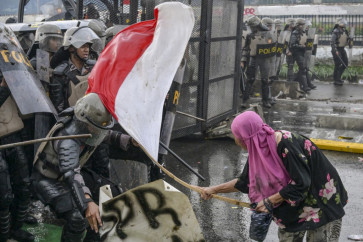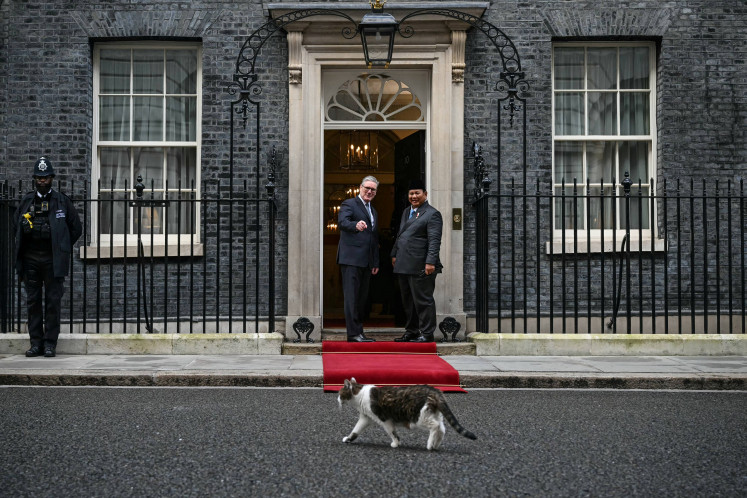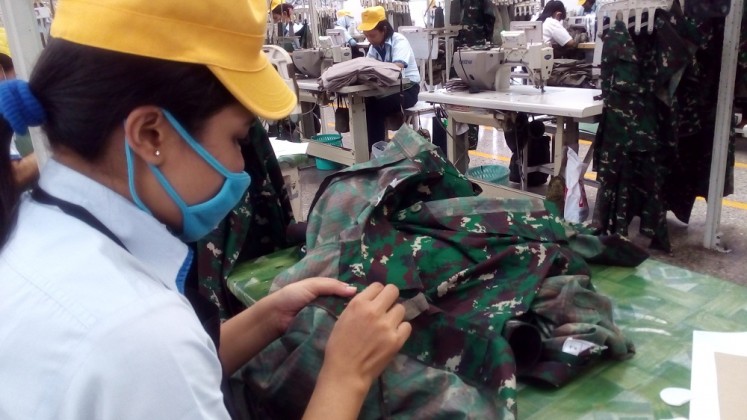Popular Reads
Top Results
Can't find what you're looking for?
View all search resultsPopular Reads
Top Results
Can't find what you're looking for?
View all search resultsAnuradha Koirala: Stopping sex trafficking
The lucrative sex trafficking industry is facing resistance from Nepal-based Anuradha Koirala, the founder of support group Maiti Nepal, and she is hopeful the industry can grind to a halt
Change text size
Gift Premium Articles
to Anyone
T
he lucrative sex trafficking industry is facing resistance from Nepal-based Anuradha Koirala, the founder of support group Maiti Nepal, and she is hopeful the industry can grind to a halt.
“You have to think positive about this, we have to believe in it,” she told The Jakarta Post.
Courtesy of CNN
The recently aired CNN documentary, Nepal’s Stolen Children, features the work of Maiti Nepal, based in Kathmandu, providing more insight into how the trade works and the group’s attempts to counter the business, colored by the star power and theatrics of Hollywood actor and anti-sex trafficking advocate Demi Moore.
The 2011 US State Department Trafficking in Persons Report has placed Nepal in Tier 2 for not fully complying with trafficking protection standards. The 2010 report said 10,000-15,000 girls and women in Nepal were trafficked each year.
Indonesia, also in Tier 2, faces the same challenge. The 2011 US State Department report identifies it as mainly a source country, and UNICEF estimates that 100,000 children and women in the archipelago are trafficked each year.
Anuradha believes at the root of the problem is the perpetrators’ attitudes toward females, and says this can change through refocusing their role in the issue. “We must help improve men’s [attitudes]. We have to give them major roles in these [prevention] activities. They have to be the major actors.”
Nepalese sex slaves are lured in to India by traffickers working at the border between it and Nepal, which is often aided by the complicity of government officials, according to the 2011 US State Department report.
Girls and women who are trafficked often come to the border with the prospect of work, sometimes sent by their families, and from there are lured into brothels.
Maiti Nepal has rescued and rehabilitated more than 12,000 of Nepal’s sex trafficking victims since it was established in 1993 through raiding brothels, patrolling the India-Nepal border and offering its support services.
“I thought I was going to have a tough time with Maili,” recalls Anuradha of a young woman who was rescued from a brothel in Mumbai, India, and taken in to Maiti Nepal.
At first Maili had a hard time settling in following the trauma she encountered as a sex worker. “But she ended up being the best motivator in the center.”
Maili found herself in a brothel after seeking help for her child. “Her child was sick. That was how she came to India, that was how she was lured there.”
After she was rescued and rehabilitated, she began volunteering from Mumbai as an informant for Maiti Nepal.
Now she is back in Nepal and has her own restaurant. “Maili’s still in contact with us,” said Anuradha. “Because her restaurant is on a highway, she is able to monitor the movements of commuters. If she suspects anything she can contact the authorities.”
Anuradha, also an abuse victim having suffered domestic abuse from her ex-husband, remains devoted to this cause despite its challenges.
“It has been very difficult for me as an observer, so you can imagine what has happened to the girls.
“They are trafficked when they are six or seven years old, the average age of sex workers is 16, so when they come back … they are suffering from many different kinds of diseases — some HIV positive, and they are traumatized.”
She first became involved in the cause following Nepal’s 1990 people’s movement, bringing forward a constitutional democracy. Prior to that, she worked as an English-language teacher.
Anuradha said she wanted to use the voice democracy had given her and so created Maiti Nepal to help curb the sex-trafficking trade of Nepalese girls into India, mainly to Mumbai and New Delhi.
When girls are brought back to the organization, Anuradha says, their road to recovery is tough.
“It’s hard for everyone. It takes about two to four months for them to even trust us.”
They then have the opportunity at the center to undertake training to empower themselves. One component of this is the inclusion of gender-balanced courses where they have the opportunity to learn not only skills such as sewing and knitting but also male-focused trades such as carpentry, to prepare them for the workforce.
Key to stopping the trade is increasing the understanding on the issue through every level of society.
“Globally we have to conduct sensitizing programs with every actor in society — from the government to the community.”
Regarding the government, she suggests Maiti Nepal collaborates with the national government on policies. Alerting the media is another important step.
At the community level she suggests holding discussions with villages on prevention measures, and better increasing children’s awareness using creative and interactive communication tools such as poetry and drama.
“You and me and everybody, we expect this issue to be globalized. One day we hope this will end and that we have a traffic-free society.”










